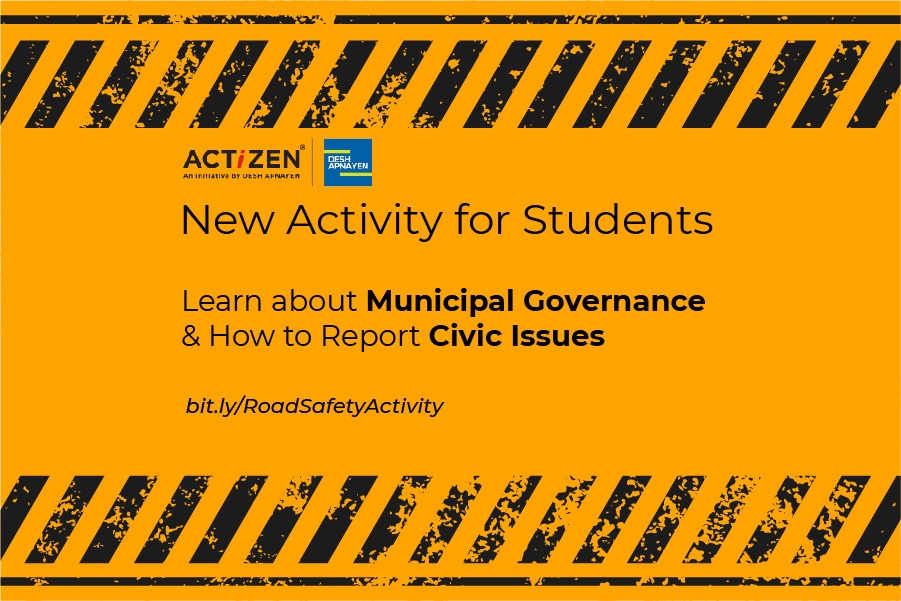

February Week 2 Activity
Road Safety and Municipal Governance
Type of Activity – Online/In-Classroom Activity
Introduction
India’s 73rd and 74th Constitutional Amendments urged the states to form a three-tier system, i.e., Panchayats in the village, intermediate and district levels, and Municipalities in the urban areas respectively. State governments then delegated a long list of 18 functions to these municipal bodies, roads and bridges being one of them.
Therefore, road safety is not only a function of the vehicles that drive on the road. The conditions of the roads and footpaths play a large role in the safety of the vehicles as well as the pedestrians, and our local municipal corporations of India are responsible for this.
Expected Outcomes
- Students will learn the functions and responsibilities of the municipal bodies towards the citizens.
- Students will hold the municipal bodies accountable by making use of their complaint portals and social media accounts.
- Students will take on the responsibility of spreading awareness of this learning to their peers.
Teachers’ Section
Steps for the Activity
- Have a discussion with the students about why the municipal corporations were created, and what their basic functions ought to be.
- If you have time, share the 18 basic functions of the municipality, as given on page 18 of the following document: https://cbpbu.ac.in/userfiles/file/2020/STUDY_MAT/POL_SC/73rd%20and%2074th-converted.pdf
- Explain to them that just as municipal bodies are required to do justice to their tasks at hand, it is extremely crucial for the citizens to hold them accountable for it because the landmark initiative (73rd and 74th Amendments of the Constitution of India) was created on the premise that all ‘power’ in the democracy rightfully belongs to ‘the people’.
- Ask the students how the municipality can be held accountable.
- Inform them about the below options that can be used to register a complaint, and ask them to study the portal available for their city so they get to know about the toll-free numbers, requirements on the complaint form, such as name, area, PIN code, photo, etc. in order to lodge a complaint.
- Complaint Portals (eg: https://portal.mcgm.gov.in/irj/portal/anonymous/qlcomplaintreg?guest_user=english)
- Social media pages (eg: Twitter)
- Toll-free numbers
- Question them what they would do if the authorities didn’t resolve the matter in the first go. Enjoin them to be patient and keep doing their due diligence as responsible citizens of India.
- Ask the students to make a chart on ‘How to File a Complaint with the Municipality Online or Offline’, and put it up at their building gate or a community area after taking permission from the Society President or community leader.
- Ask them to upload a picture of the displayed chart on our webpage, and fill up the Reflection Form under the ‘Students’ Section’.



Responses